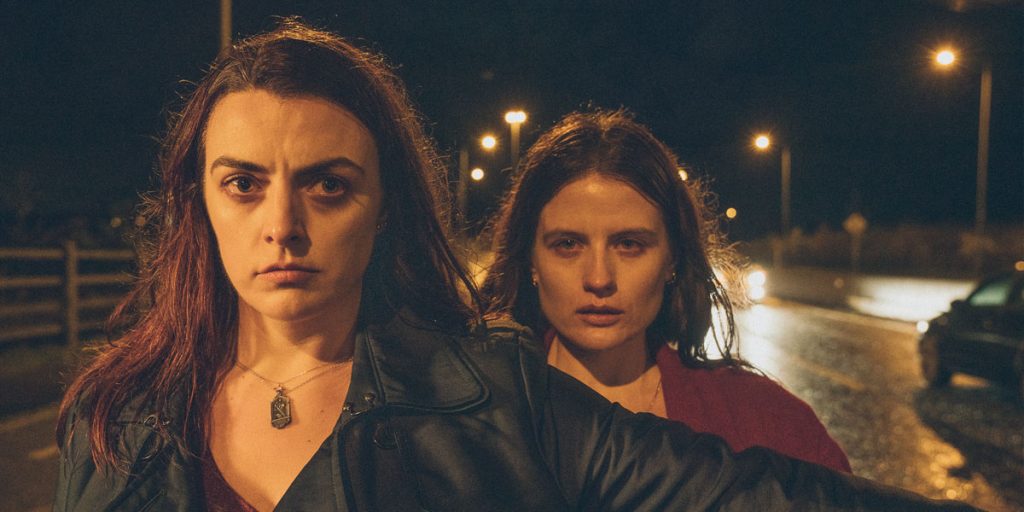Wildfire explores the traumatic remnants of (Northern) Ireland’s past conflict and the familial bonds that drive them.
Wildfire sets the time and political frame in which its events take place, through the showing of archival footage of Northern Ireland’s troubled past. The Troubles, a sectarian conflict lasting over 30 years, divided not only communities within its society, but also resulted in torn families. During that time, sisters Kelly (Nika McGuigan, Can’t Cope, Won’t Cope) and Lauren (Nora-Jane Noone, Brooklyn, The Magdalene Sisters) grow up with their mother, having lost their father during the conflict. They grew up right on the Irish border, the river in front of their old home marking the boundary between the Republic of Ireland and Northern Ireland. When the sisters also lose their mother in uncertain circumstances, it is only that can show how this will affect them. Wildfire describes a heady confrontation between Kelly and Lauren, where they have to reconcile their memories and feelings, and their very different ways of dealing with life.
Taking place around the discussion on a ‘hard Brexit’ and the issue of the Northern Irish border, the film portrays a grim and tense society. The uncertainty of the Troubles and the resulting societal behaviours are reflected in the delivery of the plot and the characters development. The slight confusion, state of uncertainty, gossiping and high social vigilance to follow communities’ moral codes turn Wildfire in a subtly suspenseful story of two women coming to terms with their traumatic pasts and their identities. This film will keep you on your toes, and it is only through the deciphering of codes in behaviour and conversation that you will be able to piece the picture together. Trauma and its discussion, after all, still remain a taboo.
Kelly, looking suspicious with her duffel bags and wild gaze, is searched from top to underwear by the border police. Having been missing for over a year (as we are informed), she hitchhikes her way across the border, back home. Stark reminders of the conflict are permeated throughout the film, from the border sign marking ‘Welcome to North one Ireland’ to a colleague of Lauren who walks around with a limp, having lost a leg in a car bombing. The difference in generation between those who lived through it, however young, and the ones who didn’t, is made painfully clear. The social surveillance common during the Troubles is still much in action. The judgmental whispers about whether or not Lauren and Kelly’s mother died by suicide subtly reflects on the sectarian nature of that history of violence. Kelly’s mystery return to her home town and her unpredictability, with mental illness laying heavy in the air, results in Lauren being torn between family loyalty and damage limitation.

As the film progresses and Kelly and Lauren’s bond intensifies, traumas and resentments bubble up and break through the careful constructions of the lives they’ve built for each other. The scarring events they went through as children can only be undone by the force of the two of them, by reliving the past in the present. This idea of the legacy of the past permeating into the present is not uncommon in trauma depicting, certainly not in post-civil war areas. Nothing on the Irish border remains just personal, the political nature of their traumatic experiences results in a liberating collision course (quite literally) with the world around them. Award-winning director Cathy Brady’s (Morning, Small Change, Wasted) debut certainly manages to handle such a delicate subject with the unease it deserves, while also serving as a tentative study in sibling relations.
What you might not expect is that Wildfire’s narrative doesn’t evolve from bitter conflict to reconciliation in a linear progression. As Lauren lets more go of her carefully compartmentalised life and falls more in step with Kelly, they leave the rigid structure of the community on the borders, and thus the influence of the past, behind. Ultimately, the film embodies the idea of the past having an influence on the future. This is represented politically, through the archival footage of the Troubles in contrast with the discussions on the hard border, and sociologically, through Lauren and Kelly’s working through of the trauma of their family that they have, for many years, hidden away. Allegorically, this denial of their family can represent a Northern Ireland working to leave its own past behind. As the sisters spiral out of social conventions, they spiral more inwards and become more intrinsic in their extraneity.
Though its flashbacks layered in foggy visuals of half-recalled memory, cinematographer Crystel Fournier captures the nature of remembering trauma and repressed memories with fine attention to detail. When viewed with an equal perception of detail, in its portrayal of trauma and post-conflict community, Wildfire is a superb film on sibling relationships that survive and thrive in a past and present vast with (imaginative) minefields. The strong female presence both on and off set result in an emotive film that does not overdo it in depicting emotions but certainly is capable of provoking strong emotional sentiments. The physical semblance and way of behaving between Kelly and Lauren is so terrifically well-acted I truly believed they were sisters in real life as well. A stunning ode to siblings with traumatic past, Wildfire is certainly worth a watch, to let its experience sink in.
Wildfire was screened at the BFI London Film Festival on 10-13 October 2020 and is now available to watch on digital and on demand.

